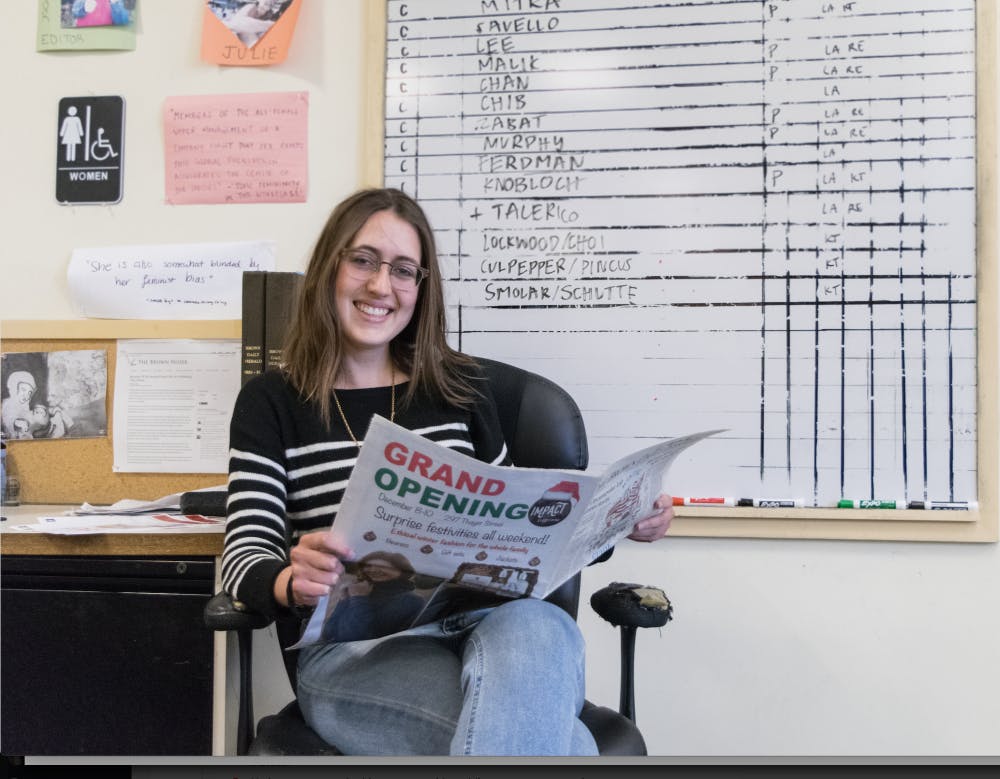I have spent hours flipping through past versions of Brown. The walls of The Herald’s office are lined with copies of the paper’s bound volumes dating back to 1892. Looking through them, I get swallowed up by the names of familiar places shrouded in unfamiliar sentiments.
In 1968, one student said that his dorm in the newly-constructed Grad Center felt like “living in the future.” In 1985, the GCB struggled to compete with the Underground when it opened as a campus bar and music venue. And in the ’40s, colonial-style East Side homes lined the quaint streets where Wriston Quad now stands.
Just as these places change with time, so do our traditions. The Young Communist League once gathered a thousand students in a “Dance, Dance, Revolution” conga line to protest Bush and “world order in general.” Zeta Delta Xi hosted its annual spaghetti party, Spagfest, during Spring Weekends of the late 2000’s. The Herald’s kickball games with our College Hill rival, The Indy, were once the “Greeze Bowl,” a football matchup against WBRU.
Institutional memory is a funny thing. Every four years, Brown’s population turns over entirely — it’s no wonder that so many of these memories are lost along the way. But somehow, certain time-honored traditions remain: Spring Weekend. The midnight organ concert. Passing through the Van Wickle Gates. And at organizations like The Herald, upperclassmen teach underclassmen to be the leaders that they were.
Last February, a month into my tenure as managing editor of The Herald, we received a visit from Sudeep Reddy, who held my position at the paper two decades ago. He paced around the office — a place where he spent hundreds of hours of his college career, as did the editors before him, as do the editors now. He smiled when he spotted our “slug board” — where the staff keeps track of the stories in the next day’s paper.
“You still have this?” he asked. “I made this!”
I had never really thought of The Herald existing without the slug board — how else would editors have organized their work throughout the night? And yet, all those practices that seem woven into the fabric of the institution, were at one time the idea of a single student, given permanency by those who came after.
I have been thinking about my legacy at this university, and if anything I’ve made here will stay around after I leave through the Van Wickle gates. My friends joke that my legacy is cemented in the words I’ve written in this paper. It’s true — one day, maybe, a student flipping through the archives will read articles with my byline. The stories I’ve told will form an understanding of our time for students 10, 20, 30 years from now.
But I think it’s a different question that’s beneath all that: is my time here special?
I sometimes imagine all of the monuments on this campus I would erect if I could: next to the tree on Charlesfield, a monument to my first kiss during Summer@Brown. At the carrels on the third floor of the Rock looking out over University Hall, a monument to the place I finished my series on mental health. In the back office of The Herald, the site of 127’s hardest conversations, a monument to where I cried and argued and laughed with Lauren on too many late nights to recall.
I could map a million overlapping memories under my favorite tree on the Main Green, overlay the silhouettes of countless students hunched over theses at the John Hay. But these places aren’t mine. They can’t be claimed with monuments. If we all got to erect our little monuments — the campus would be littered with them. This place has held layers and layers of memories for the last 250 years for people before and after us.
When I read The Herald’s archives, the faces and names change, but the places don’t. At least, not fundamentally. While my writing may offer some permanent record of our time here, Brown itself is a palimpsest: a manuscript constantly rewritten by the thousands of people that pass through it every four years. Their ambitions, their friendships, their monuments that sometimes brush up against my own.
The word “fugue” can mean two things: a state of losing your identity, usually linked to leaving your usual environment; or a melody introduced in one part of a musical composition and then interwoven successively through the rest of the piece. As I leave Brown, I’m starting to wonder if the two definitions can be connected. That, even as I leave some of my identity behind on Brown’s campus, perhaps those parts will endure. They will be picked up by someone else during their time here — the writers who have taken my spot at the office, the editor 10 years from now who, on a late night in The Herald, flips through the 2018 bound volumes and finds this piece — and they will be strung back into the composition of the campus. The song plays on and on and on.

ADVERTISEMENT




